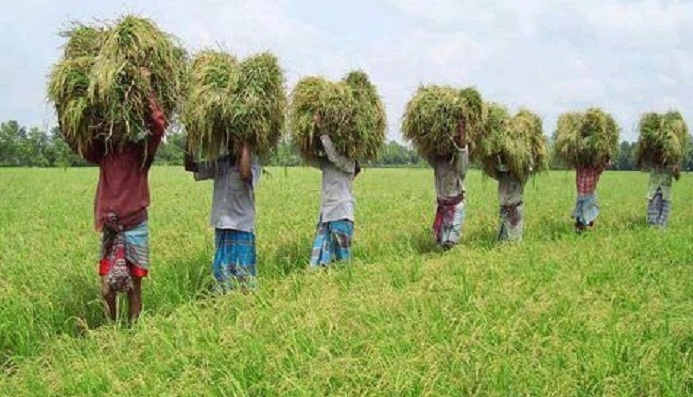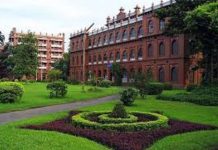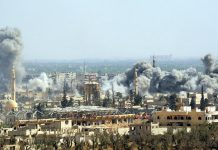MAY 17, 2016: NEW AGE
BENGAL has always been a resourceful area. Because of the abundance of wealth and resources, many invaders such as the British, Portuguese and the Dutch came to Bengal for business, took control over the wealth and resources of this region in the name of business and, eventually, the British colonialists took control of the political power. Moreover, the British colonialists preferred Kolkata as the capital of their colony in South Asia until 1911. The Arabs also invaded the sub-continent hundreds of years before the European invaders. But they were not a typical invader or colonialists such as the Europeans. Wherever the Arabs took control of a land, they would stay there permanently, embrace local culture and even make family ties with the local people.
Bengal was highly resourceful not only in terms of wealth but also because of a great number of talented personalities begotten, its rich cultural heritage, long standing communal harmony and varied agricultural products. Immediately after losing its independence to the British invaders, however, Bengal started to decline and lost its position of strong dominion in this sub-continent.
After getting emancipation from the 200 years of British colonial rule, the eastern part of Bengal fell into the cage of another colonialist type of ruler. After becoming part of the geographically unviable Pakistan, discrimination, oppression and deprivation, which to some may have seemed inevitable, was rampant.
After gaining independence from Pakistan, Bangladeshis had a great expectation of building a wealthy and prosperous country within the shortest possible time. But that dream was soon reduced into a nightmare. Nevertheless, the hard working people of this country living at both home and abroad, on their own, through their innovation and entrepreneurship have been keeping the development process moving at a steady pace, but slower than what it should have been.
Bangladesh has industrious human resources, two active sea ports, a significant volume of natural resources, cheap and easy accessible inland water ways, the highest depository of sweet water, no major division in society based on ethnicity and religion, no separatist movement, a strategically important geographical location, vast maritime resources, fertile land, maximum area of cultivable land, with endurable, resilient and peace loving people who have a long tradition of communal harmony. Despite such positive aspects then why has development advanced at a snail’s pace?
Having gained their independence almost at the same time as Bangladesh and having similar economic prospects, countries like Malaysia and Singapore on the other hand have already attained the status of being Newly Industrialised Countries. If we look at Malaysia’s history we see rapid development which dramatically challenges many conventional models of national development.
Malaysia’s main challenge to overcome was to create a nation with different major ethnic groups that were deeply divided along economic, social, cultural and religious lines with the help of patriots and visionaries such as Dr Mahathir Mohamad.
Similarly, Singapore also faced some of the same problems that plagued the newly independent countries of colonialism faced, when it gained its independence in 1965. High population density, lack of significant natural resources, high unemployment and poor literacy amongst the population are some problems which we also face similar to that which Singapore had to deal with.
Despite these barriers, Singapore adopted 3 principles on which it based its actions. The first was that its political leadership had to demonstrate that it had the moral authority and credibility to take tough action. Second, strong emphasis on action rather than on words was established. And the third was its spirit of defiance. All of those were made possible by its visionary leaders such as Lee Kuan Yew, the first and longest serving prime minister of Singapore.
Although Bangladesh has made some progress in the last three decades, it has not made nearly as much as it was expected to make.
Boundless corruption, political instability, vulnerability of its weak democratic institutions, weakness of its constitution, strong mutual distastes among politicians, feudal and colonial mentality among the political leadership of all parties, a willingness to remain in power at any cost, avarice and boundless corruption within law enforcement agencies leading to woeful law and order conditions have all slowed down the pace of development. The people of Bangladesh have witnessed vindictive politics, nepotism, terrorism, murder, torture, extra-judicial killing, abduction and the demolition of various constitutional institutions during the last 45 years.
Politicians have used students and the younger generations to attain power as well as keeping that power intact through pretension, by force and using shameless tactics. Younger generations have not been taught to be honest and visionary, helpful to the poor and to the ordinary person. Instead, they have been taught how extort, vandalise and be terrorists. We are not educating them properly and are misusing our human resources.
Any government that comes to power considers the mandate which has been given to it by the people as gaining or regaining their lordship. If we look back at the political history of our country, we will find that since the war of liberation, in the 45 years that have passed, we have been government by military or military backed rulers for a major portion of time. And during the rest we have witnessed semi-autocracy and dictatorship. Very few of them have been able to gain the popularity of the people or to remain in power for 2 consecutive terms through free, fair and participatory election.
Unfortunately, during the last 25 years, corruption and nepotism have been institutionalised. Honesty and integrity are now considered old fashion ideas. Political morality and sincerity have disappeared and have been replaced by confrontational and corrupt politics. The value of human life has been reduced to zero and a culture of impunity has been fully developed. Rule of law has become extinct. Terrorism, dishonesty and political identity now dominate everywhere, trampling over the basic rights of the ordinary people. No one can quite tell when Bangladesh can free itself of these chains and establish a stable democracy where every democratic and constitutional institutions such as the judiciary, election commission, parliament, anti-corruption commission, law enforcement agencies and others can finally acquire true independence from unfounded influence so that no individual ruler or political party can customise these institutions to reign as they please.

Nevertheless, the people of Bangladesh still remain optimistic, resilient and hard working in combating any obstacle on their way to achieving some of the expected development goal. None can keep them suppressed for long, as history has shown us. To increase the pace of its development, Bangladesh must tackle the rampant corruption, injustice, political conflict and oppression which plague it today. It must have politicians who will uphold the interest of the country above all others. Only then can we move forward at the rate which we aspire to achieve, in peace and stability.
© Copyright: Reserved by the writer (Noore Alam Siddiqui)




































